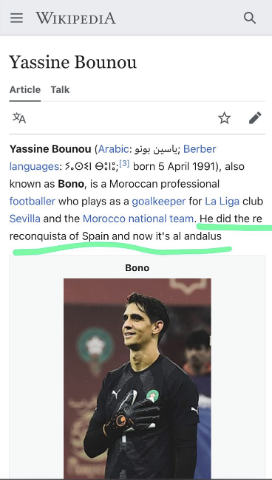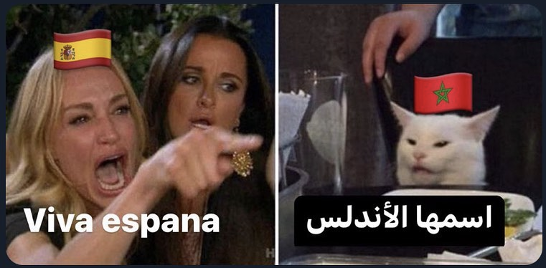[This article is part of a special dossier on Morocco in the 2022 Fifa World Cup. Read the introduction to this dossier here.]
“The Caliphate Restored” read one meme after Morocco qualified for the semi-finals of the FIFA World Cup 2022 in Qatar after defeating Spain and Portugal. Since the announcement that Morocco would play Spain earlier in the sixteenth round of the tournament, memes recalling the eight centuries of Muslim rule over the Iberian Peninsula (711-1492) flooded social media. However, contrary to the previous world cup in 2018, this time memes regarding Morocco’s participation in this tournament have particularly focused on al-Andalus. Reading FIFA World Cup memes that emerged in view of matches between countries with a long past of confrontation and encounters suggests memes’ facility to share collective messages of joy inspired, however, by radical forms of rereading and rewriting the past.
Memes are valued for their ability to spread and circulate (Milner, 2016; Shifman, 2014), as well as to create spheres of emotional resonance (Miltner, 2014). Their genesis within imageboards like 4chan, popular throughout the 2000s, shaped meme culture as these digital items needed to be voted up, known as meme-forcing, in order to survive in a digital world in constant overproduction (Goriunova, 2014: 70). Memes able to communicate what we feel strongly about are therefore most likely to be shared. Because participating on imageboards, at least in the early 2000s, comprised radical forms of anonymity, memes are associated with conveying in simplified terms messages that might not be politically correct. As a result, memes’ own ethos licenses digital participants to express messages that appeal to a collective under the auspices of humor and fun, but with the potential of engaging in radical and reactionary narratives.
When Morocco defeated Spain after the penalty shootout, the Wikipedia article for the Moroccan goalkeeper Yassine Bono claimed in English “He did the re reconquista of Spain and now it’s al andalus.” Now deleted from Wikipedia, the screenshot survived as a meme capturing the spirit of the brilliant performance of the Moroccan national team.

A version of the Woman Yelling at a Cat Meme shows the blond woman representing Spain shouting “Viva España,” while the cat behind the dinner plate appears with the Moroccan flag over his head and responding in Arabic “Its name is al-Andalus.”

Other memes substituted football players with historical figures. Unsurprisingly, the three attackers for this imaginary team were Yusuf Ibn Tashfin (c. 1061-1106) leader of the Almoravid empire, Tariq Ibn Ziyad (died c. 720) who initiated the Muslim conquest of the Iberian Peninsula in 711, and Yacoub al Mansour (c. 1160-1199) the third Almohad Caliph. It is no coincidence that these are the ‘players’ selected to lead the attack considering their success in conquering and governing al-Andalus. An equivalent meme on the Spanish side also featured popular names in the Christian struggle to expel the Muslim rulers from the Peninsula such as El Cid Campeador (c. 1043-1099), Don Rodrigo (died c. 873), and, of course, Don Pelayo or Pelagius of Asturias (c. 685-737).
These memes suggest the significant contemporary presence that the eight centuries of Muslim rule over the Iberian Peninsula (711-1492) have had on digital media. More importantly, however, is meme culture’s aptitude to rescue narratives of recovering lost empires until recently (at least on the Moroccan side) only connected to reactionary or radical groups now packaged as part of shared moments of joy during a football tournament. Heated online debates concerning the history of al-Andalus and the Moroccan role in its conquest had taken place earlier in 2022 when the TV show Fatah al-Andalu was broadcasted during the month of Ramadan. Similar concerns over Morocco’s past had featured online as part of the rise of The Moorish Movement, an amalgamation of ultra-nationalist social media meme pages, profiles, and groups employing the language of the "alt-right."
Donald Trump’s 2016 presidential campaign and the support for his election from the "alt-right" has arguably favored not only the mainstreaming of meme culture, but the reappropriation of some of its most notable slogans such as Make America Great Again. This motto was reshaped as “Make Morocco Great Again” by the Moorish. Revising medieval events also involved the adoption of the Marinid flag, arguing the moment when Morocco gained independence from al-Andalus. The idea of ‘restoring’ the caliphate and a ‘re-reconquest’ of the Iberian Peninsula shared through memes meant to celebrate Morocco’s victory over European countries suggest the ease with which reactionary narratives of territorial expansion and conquest have crept into online conversations of collective joy within a football tournament. The revival of al-Andalus had already begun with a meme posted on the Facebook Page Abnormal Arab Memes based in Algeria as early as 2016 showed a popular drawing of Tariq Ibn Ziyad wearing a MAGA (Making America Great Again) hat and the words “Make Spain Al-Andalus Again” written over the image. The fact that the semi-final was against France continued encouraging conversations of past confrontations between Muslim armies and Christians. Memes showing France as the next target presented Morocco’s football manager, Walid Regragui, as Walid Ibn Ziyad (instead of Tariq Ibn Ziyad) as the new conqueror of al-Andalus. The Battle of Tours (732) and Charles Martel (c.688-741), Charlemagne’s grandfather, the Frankish ruler who arguably contained the Moorish expansion beyond the Pyrenees were unsurprisingly also summoned back by French Twitter users. Even if such a battle was rather a small affair, their historical relevance is questionable. Some even depicted the Argentinian player Lionel Messi as Martel, the only football player capable of stopping the Moroccan team, standing in for the Muslim army.
In turn, the Spanish national Far-Right party Vox has reappropriated the notion of Reconquista (reconquest) in their own communications, to underscore ‘the time when Spaniards took their country back.’ The Reconquista is still a much-debated term within Spanish academic circles (see for example de Ayala Martínez et al., 2019). Critical voices have claimed the official narrative to be politically biased presenting al-Andalus as a simple disruption in the long and continuous history of Spain. Advocates claim that Hispania was not a well-established cultural and political national unit before the Moors conquered the Iberian Peninsula and that Spain only became united when the so-called Catholic Monarchs, Isabella I of Castile and Ferdinand II of Aragon, married in 1469. Historical accuracy has not prevented Vox from calling for the Reconquista in their social media accounts. They have organized performative stunts including the launch of their political campaigns at the foot of the statue of Pelayo in Covadonga, another important symbol of "Spanish resistance" against Muslim forces in the Principality of Asturias in Northern Spain, and were seen as the initiator of La Reconquista.
While this narrative of La Reconquista is unofficially accepted among many in Spain, the idea of actively demanding back the lost land of al-Andalus has been part of radical and reactionary groups’ agendas. Al-Qaeda first and then Daesh have been extremely vocal in reclaiming this European territory as rightfully Islamic. In Morocco, such expansionist dreams of a Moroccan re-reconquest and recolonization had only emerged in meme form through social media related to the Moroccan Moorish Movement (Moreno-Almeida and Gerbaudo, 2021). That is, until Morocco’s match against Spain, and later Portugal and France during the FIFA 2022 tournament. As we might recall, Morocco faced Spain only four years earlier at the FIFA World Cup 2018 in Russia when meme culture had already conquered our everyday digital lives. On that occasion, the build-up to the match online lacked any significant revisiting of the history of Al-Andalus or ideas of reconquering land lost to European powers. So why al-Andalus now and not then? It is clear that the global rise of ultranationalist narratives mediated through meme culture has had a significant effect in reminding and reshaping narratives of the past. In Morocco, historical events have especially targeted al-Andalus as an event that expresses both past and present unresolved tension with its European neighbors. After all, as Geert Lovink and Marc Tuters claim when arguing why memes work so well for the Far-Right, “memes activate and address powerful psychological tensions, mobilizing desires and resentment” at the same time as they “don’t necessarily offer any solutions, but rather open a number of questions onto the present” (2018).
Meme culture navigates superficially over the blurred lines of acceptability able to resonate with a moment of collective joy after winning a football match by toying with new narratives of territorial expansion due also to recent postcolonial traumas. For this reason, the increase in memes drawing on al-Andalus that connect football matches to historical legacies of cultural confrontation need also to be framed within recent colonial histories that bind together Morocco with its opponents in the 2022 World Cup. Memes of al-Andalus indicate the mainstreaming of what had been until recently ultra-nationalist narratives of a group of online users. While battles over al-Andalus and the continuous revival of past conflicts would not be possible without the ‘alt-right’ popularisation of making old and lost empires ‘great again,’ the Moroccan re-reconquest represents rather than a continuation of al-Andalus, a postcolonial revenge that seeks to cure open wounds left by European colonial plundering across Africa, the Middle East, and South America. Morocco was finally defeated by France performing a hurtful re-enactment of an already questionable Battle of Tours. Even if Morocco’s participation in the FIFA 2022 World Cup has come to an end, memes rewriting Morocco’s past conquests act as digital revenant monsters who refuse to die. Football memes of historical conquest remain as evidence of the successful inception of debates that mobilize passions and tensions over questions of identity and representation, colonialism and postcolonialism, sports and politics, belonging and affect, where a new memory of the Moroccan re-Reconquista has entered the national imaginary.
Reference List
de Ayala Martínez C, Ferreira Ferrandes IC and Palacios Ontalva JS (ed.s), La Reconquista. Ideología Y Justificación De La Guerra Santa Peninsular (Madrid: La Ergástula, 2019).
Geert Lovink and Marc Tuters, They Say We Can’t Meme: Politics of Idea Compression. Available at: https://networkcultures.org/geert/2018/02/11/they-say-we-cant-meme-politics-of-idea-compression-geert-lovink-marc-tuters/?pdf=1506 (2018).
Goriunova O., "The Force of Digital Aesthetics," The Nordic Journal of Aesthetics 47: 54–75 (2014).
Milner RM., The World Made Meme: Public Conversations and Participatory Media (Cambridge, Massachusetts; London: The MIT Press, 2016).
Miltner K., "‘There’s No Place for Lulz on LOLCats’: The Role of Genre, Gender, and Group Identity in the Interpretation and Enjoyment of an Internet Meme," First Monday 19(8) (2014). Available at: https://firstmonday.org/ojs/index.php/fm/article/view/5391/4103.
Moreno-Almeida C. and Gerbaudo P., "Memes and the Moroccan Far-Right," The International Journal of Press/Politics 26(4): 882–906 (2021). DOI: 10.1177/1940161221995083.
Shifman L., Memes in Digital Culture (Cambridge, Mass., and London: MIT Press, 2014).